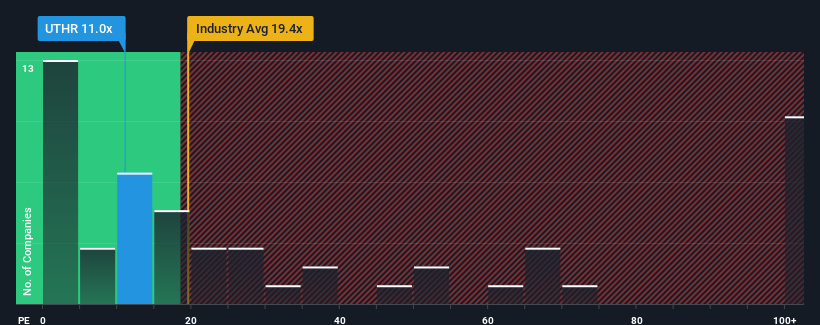
When close to half the companies in the United States have price-to-earnings ratios (or "P/E's") above 17x, you may consider United Therapeutics Corporation (NASDAQ:UTHR) as an attractive investment with its 11x P/E ratio. However, the P/E might be low for a reason and it requires further investigation to determine if it's justified.
With earnings growth that's superior to most other companies of late, United Therapeutics has been doing relatively well. It might be that many expect the strong earnings performance to degrade substantially, which has repressed the P/E. If you like the company, you'd be hoping this isn't the case so that you could potentially pick up some stock while it's out of favour.
See our latest analysis for United Therapeutics

What Are Growth Metrics Telling Us About The Low P/E?
In order to justify its P/E ratio, United Therapeutics would need to produce sluggish growth that's trailing the market.
Retrospectively, the last year delivered an exceptional 26% gain to the company's bottom line. The strong recent performance means it was also able to grow EPS by 151% in total over the last three years. Therefore, it's fair to say the earnings growth recently has been superb for the company.
Shifting to the future, estimates from the analysts covering the company suggest earnings should grow by 3.2% per annum over the next three years. Meanwhile, the rest of the market is forecast to expand by 10% per year, which is noticeably more attractive.
In light of this, it's understandable that United Therapeutics' P/E sits below the majority of other companies. Apparently many shareholders weren't comfortable holding on while the company is potentially eyeing a less prosperous future.
What We Can Learn From United Therapeutics' P/E?
We'd say the price-to-earnings ratio's power isn't primarily as a valuation instrument but rather to gauge current investor sentiment and future expectations.
As we suspected, our examination of United Therapeutics' analyst forecasts revealed that its inferior earnings outlook is contributing to its low P/E. At this stage investors feel the potential for an improvement in earnings isn't great enough to justify a higher P/E ratio. Unless these conditions improve, they will continue to form a barrier for the share price around these levels.
A lot of potential risks can sit within a company's balance sheet. You can assess many of the main risks through our free balance sheet analysis for United Therapeutics with six simple checks.
Of course, you might find a fantastic investment by looking at a few good candidates. So take a peek at this free list of companies with a strong growth track record, trading on a low P/E.
Have feedback on this article? Concerned about the content? Get in touch with us directly. Alternatively, email editorial-team (at) simplywallst.com.
This article by Simply Wall St is general in nature. We provide commentary based on historical data and analyst forecasts only using an unbiased methodology and our articles are not intended to be financial advice. It does not constitute a recommendation to buy or sell any stock, and does not take account of your objectives, or your financial situation. We aim to bring you long-term focused analysis driven by fundamental data. Note that our analysis may not factor in the latest price-sensitive company announcements or qualitative material. Simply Wall St has no position in any stocks mentioned.